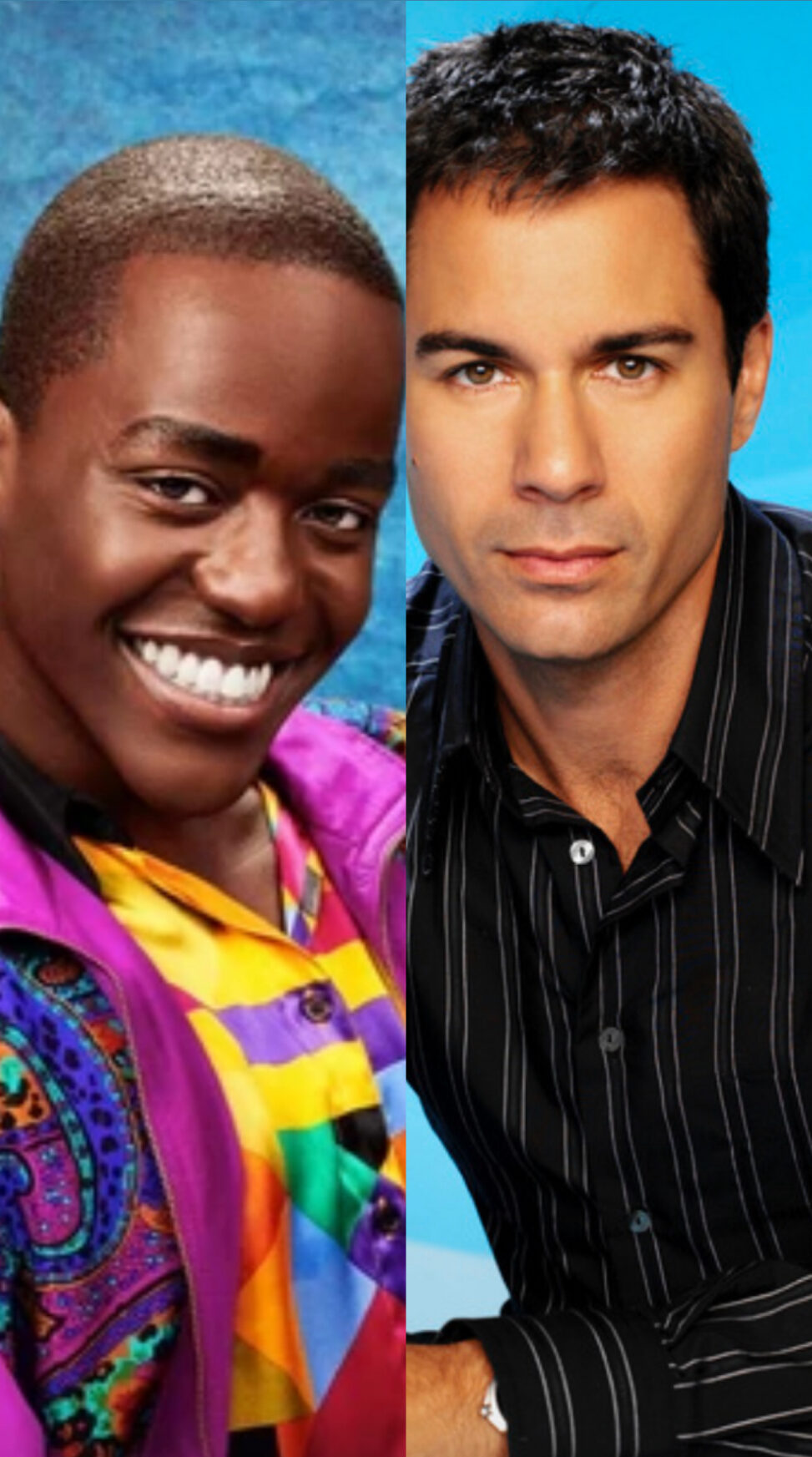Moving from the Margins to the Center: Comparing Gay Male Representation in Will & Grace and Sex Education
Charlotte Oliver
VISA 1500
October 29, 2025
Will Truman from Will and Grace played by actor Eric McCormack and Eric Effiong from Sex Education who was played by Ncuti Gatwa are both actors that played as gay characters, however, Ncuti Gatwa is actually part of the LGBTQ community in real life.
Eric Effiong, is a black homosexual character who is outgoing and willing to show his sexuality off. Eric constitutes one of the queerest characters included in the show whose identity is determined by diverse intersecting directions of disadvantage that at once maintain places of oppression and exclusion. He is religious, presents a non‐normative gender expression, is black and coming from a working‐class family and, despite being Otis’ best friend, in no moment is he relegated to the superficial role of “gay best friend.” (1)
Some of Will’s attributes are that he is a highly educated, successful lawyer. His professional, middle-class image made him relatable and respectable to mainstream audiences. This framing helped normalize gay identity by associating it with intelligence and success rather than stereotype. He is also emotionally supportive, especially towards Grace which shows his nurturing side that gay men can be empathetic and loving friends, breaking earlier TV stereotypes of gay men as comic or shallow. (2)
Eric has some unique attributes such as his bold self-expression in fashion, makeup, and style. He uses his appearance to assert his queer identity and challenge norms around masculinity and sexuality. He also has an intersectional identity by being Black, gay, and from a religious immigrant family. His character illustrates how sexuality, race, faith, and cultural intersect, offering a more complex representation of queer teen life.(3)
When it comes to moving away from being stereotypical, Will Truman is seen more as stereotypical even while his character was groundbreaking, it wasn’t without limits. The show often portrayed Will’s sexuality in a way that was acceptable to main audiences, sometimes downplaying the complexities of gay life.(4)
On the other hand, Eric Effiong is not seen as a stereotypical character as he challenges stereotypes of queer identity through his multifaced character. His character is depicted as a confident and unapologetically queer Black teen who navigates the complexities of his identity with resilience and authenticity. His journey includes confronting homophobia, reconciling with his Nigerian heritage, and building a supportive community.(5)
The portrayal with Eric’s character I think creates real life queer individuals to be bold, confident, and expressive like he is. It may also make viewers become more aware about queer experiences and diversity and shaped by race, religion, and family background. Will Truman is a successful lawyer, financially secure, and socially well-connected. This can create the expectation that gay men should be professionally ambitious which is not representative of everyone’s reality.
Some effects that Will and Grace had on audiences is how the characters helped normalize LGBTQ plus representations on TV. The show was credited with improving public perception of gay individuals and was even cited by then, Vice President Joe Biden as having “probably did more to educate the American public” on LGBTQ issues than almost anything else. This is a very positive thing that is great to be shown to the public.(6)
There were a lot of positive effects with Eric Effiong’s character as he is very embracing about his sexuality and cultural heritage which offers a sense of empowerment to viewers who see themselves reflected in his journey throughout the show.(7)
Relating to race and ethnicity, Eric’s Black British Nigerian history gives visibility to queer Black youth and immigrant identities. The article shows this as a positive shift because you don’t really see this on British TV, but also notes the realistic risks faces by queer Black people in places like Nigeria which is some backlash potential. (8)
In one of the Sex Education episodes, Eric takes a trip to Nigeria and his mother’s concern reflect the cultural/immigrant family dimension and how queer identity interacts with dissolution and religion, a complex area of both change and backlash.
Speaking about Will Truman’s character, some critics say that he was a “safe” gay character, being white, professional, well adjusted, and somewhat integrated, which may limit the diversity of representation.(9)
Will is an adult lawyer rather than a younger or inexperienced character which has its positives and negatives. A positive being it showed a gay character in a stable, successful life stage, which provided positive role modelling, however some backlash is how it doesn’t reflect younger queer people’s experiences or those in earlier stages of identity development.(10)
1. Vasquez-Rodriguez, Garcia-Ramos, Zuria, “The Role of Popular Culture for Queer Teens Identities’ Formation in Netlfix’s Sex Education”, 201.
2. Battles, Kathleen, and Hilton-Morrow, “Gay Characters in Conventional Spaces: Will and Grace and the Situation Comedy Genre”, 90.
3. Hallman, “Won’t Somebody Think of the (Queer) Children?!”, 200
4. Capsuto, “Alternate Channels: The Uncensored Story of Gay and Lesbian Images on Radio and Television, 1930s to the Present.”
5. Okundaye, “Sex Education’s, complex portrayal of black queer teenhood.”
6. Wikipedia, “Will & Grace.”
7. Okundaye, “Sex Education’s vital, comples portrayal of black queer teenhood.”
8. Silver, “Sex Education’s’ Eric Effiong is inspiration to Nigeria’s gays,” para. 5.
9. Lang, “Don’t revive ‘Will & Grace’: We don’t need its limited portrayal of gay life anymore,” para. 4.
10. Wikipedia, “Will & Grace.”
Bibliography:
1. Vazques-Rodriguez, Lucia-Gloria, Francisco-Jose Garcia-Ramos, and Francisco A. Zurian. “The Role of Popular Culture for Queer Teen Identities’ Formation in Netflix’s Sex Education.” Media and Communication 9, no. 3 (2021) https://www.cogitatiopress.com/mediaandcommunication/article/viewFile/4115/2270?utm
2. Jacobs, Jason. Will & Grace: Defining Gay Visibility on American Television. Los Angeles: California State University, Northridge, 1998. will&grace-csmc.pdf
3. Hallman, Louise Elizabeth. Won’t Somebody Think of the (Queer) Children?! Changing Representations of and Media Reactions to Same-Sex Attraction and Queer Relationships in British Teen Television, 1994 and 2019. Master’s thesis, Orebro University, 2023. https://www.diva-portal.org/smash/get/diva2%3A1847156/FULLTEXT01.pdf
4. Capsuto, Steven. Alternate Channels: The Uncensored Story of Gay and Lesbian Images on Radio and Television. New York: Ballantine Books, 2000. Alternate channels : the uncensored story of gay and lesbian images on radio and television : Capsuto, Steven : Free Download, Borrow, and Streaming : Internet Archive
5. Okundaye, Jason. “Sex Education’s Vital, Complex Portrayal of Black Queer Teenhood.” Dazed Digital, January 22, 2019. https://www.dazeddigital.com/film-tv/article/43014/1/sex-education-eric-netflix-black-queer-teens-ncuti-gatwa
6. “Will & Grace.” Wikipedia. The Free Encyclopedia. Last modified October 28, 2025. https://en.wikipedia.org/wiki/Will_%26_Grace
7. Okundaye, Jason. “Sex Education’s Vital, Complex Portrayal of Black Queer Teenhood.” Dazed Digital, January 22, 2019. https://www.dazeddigital.com/film-tv/article/43014/1/sex-education-eric-netflix-black-queer-teens-ncuti-gatwa
8. Silver, Marc. “Sex Educations’ Gay teen Eric Takes a Risky Trip to Nigeria, How Realistic Is It?” KPBS, October 14, 2021. https://www.kpbs.org/news/national/2021/10/14/sex-educations-gay-teen-eric-takes-a-risky-trip-to-nigeria-how-realistic-is-it
9. Lang, Nico. “We Don’t Need Will & Grace’s Limited Portrayal of Gay Life Anymore.” Salon, October 30, 2016. https://www.salon.com/2016/10/30/dont-revive-will-and-grace-we-dont-need-its-limited-portrayal-of-gay-life-anymore/
10. “Will & Grace.” Wikipedia: The Free Encyclopedia. Last modified October 28, 2025. https://en.wikipedia.org/wiki/Will_%26_Grace
11. OpenAI. ChatGPT (GPT-5). “Assisted with citing sources in Chicago style and formatting.” ChatGPT, October 29, 2025. https://chat.openai.com/


Isi Meade
Charlotte clearly identifies both characters’ traits. Explaining that Will is reserved, professional, and Eric is expressive, intersectional. She highlights the differences in time period, tone, and representation: Will’s “safe” portrayal vs. Eric’s modern, multifaceted depiction. Charlotte shows understanding of how each show reflected its cultural context.
Some of Charlotte’s main points are Will Truman helped normalize gay identity on mainstream TV by being professional, relatable, and respectable. His character broke stereotypes but still fit within safe, middle-class norms. Unlike Will, Eric challenges norms more boldly. He is openly queer, Black, and religious, and his reflecting intersectional identities is rarely seen before. Both shows contributed to improving representation, but Sex Education pushes inclusivity even further.
Charlotte used a wide range of sources, including academic sites like Hallman, Vasquez-Rodriguez. I could not access numbers two to four in Charlotte’s bibliography; and numbers five to eleven are all non scholarly sources. I also like that she uses direct references that match the bibliography. Some of Charlotte’s non-scolary sources are Wikipedia, and ChatGPT. I think she could have integrated some of the scholarly sources into her essay a bit more.
I think the photos she chose clearly represent the characters, and the argument she made in the essay. I also like how it effectively shows the contrast between them, and the movement from “safe” visibility to authentic intersectionality.
There are a few things I think she could have done better. I think she could have explored audience reception differences, how older vs. younger audiences perceived each character. She also did not address intersectionality in Will’s character (class privilege, whiteness) as deeply as Eric’s. The essay could have included specific scene examples or visuals from the shows to strengthen this comparison further. Besides these few things, overall, I think Charlotte did a great job.